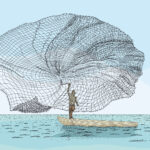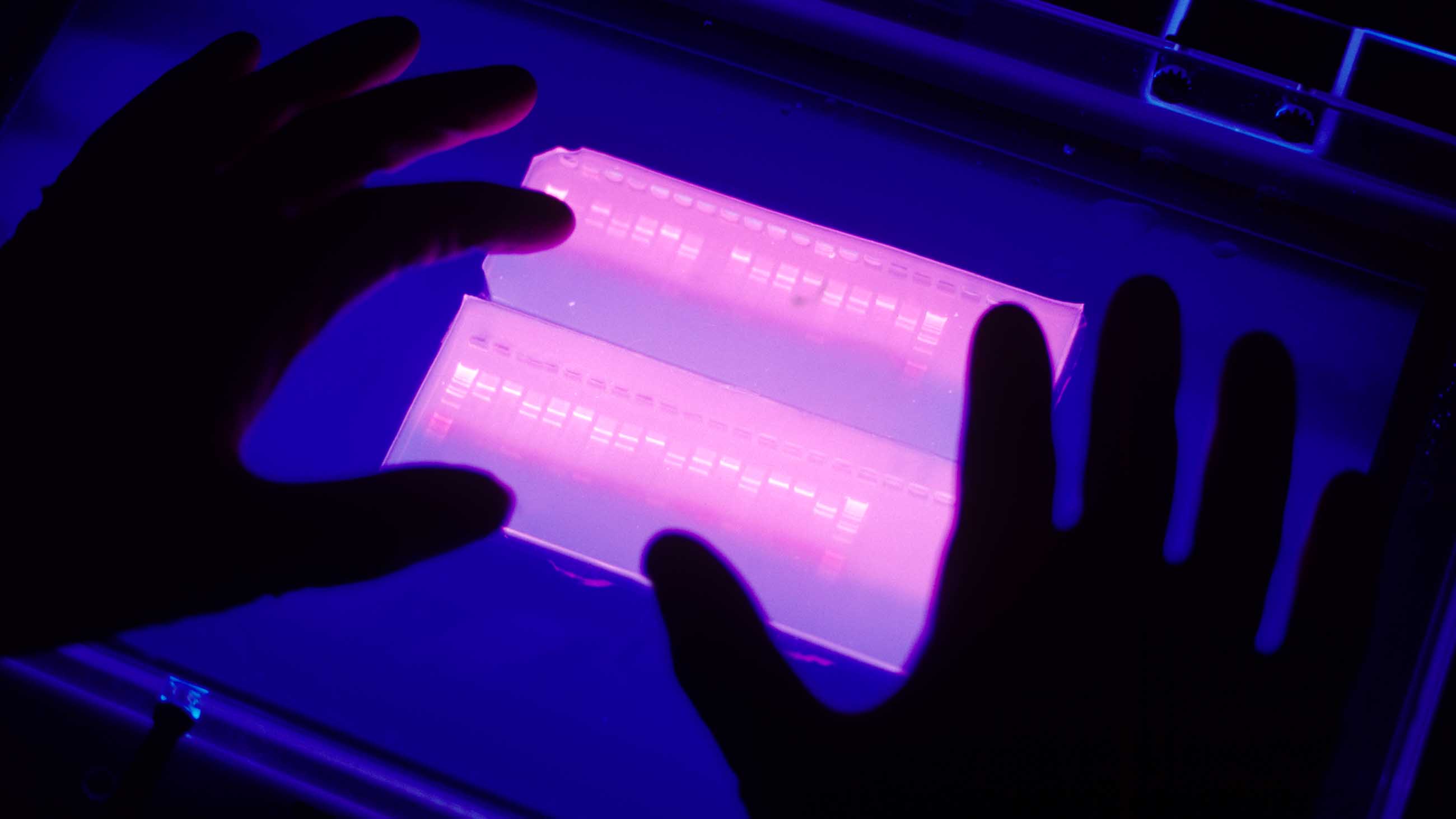Ihave never understood why anybody would think humans are by nature violent, warlike creatures. True, we have all surely had arguments turn sour and go off the rails — arguments sometimes so extreme, or even deadly, that we later wish we could take back what we have said and undo what has happened. So yes, we humans do have the physical and emotional capacity to be nasty and even violent creatures when we feel threatened or frightened. Yet if there is anything about being human written in our genes by evolution, it’s not that we are dangerous animals. Instead, it’s that we are one of Earth’s strongly social life forms. Some of us may not be as social as others. Yet most of us know that the words “gosh, I need a hug” are about more than just a sudden call for physical contact. Most of us not only want to be around others, we also need to be. That’s just being human.

VIEWPOINTS
Partner content, op-eds, and Undark editorials.
If I am right that our kind of animal not only likes but needs to feel connected with others of our kind, then perhaps this human trait may explain in part why many people today are sending off some of their spit or a used buccal swab to a for-profit genotyping service, such as AncestryDNA and 23andMe. People may have many different reasons — perhaps quite personal — but they may include discovering new relatives to connect with, perhaps even folks to invite for dinner next Thanksgiving or Christmas.
Whatever the motivations, the current popularity of commercial genetic profiling worries me for two reasons. One is that these companies may be promising results they can’t actually deliver. The notion, for example, that our genes can be used to trace our personal ancestry far back into the past — say, to Genghis Khan, the Emperor Charlemagne, or one of the pharaohs of ancient Egypt — makes little statistical sense. You may disagree, but to me this comes across as selling something more akin to snake oil than science.
What worries me most, however, is that companies offering personal genetic testing customarily seem to report back to those sending along a sample of their spit that they are a mix of different “ethnicities.” This is more than simply statistical nonsense. I fear doing this can also be dangerous. Claiming that it is possible to map ancestry in this fashion may be giving discredited old ideas about ethnicity and race new visibility.
Before tackling my second concern, however, let’s first talk about everyone’s least favorite topic, namely statistics.
To weight the pros and cons of commercial genetic testing, it is worth working through the numbers.
Despite the wars, border tensions, and other types of violence that stem from perceptions of human difference, we are approximately 99.9 percent identical to every other human on Earth in terms of our genetics. In short, we are all cousins. Even when you drill into the specifics of the remaining 0.1 percent to learn something more detailed about your biological ties, don’t get your hopes up that you can identify real ancestors very far back in time.
Here’s the basic math. We inherit roughly half our genes from our mothers and half from our fathers. If one or both of them should be unknown to you, it is a safe bet gene profiling may help you track them down. But how far back across the generations can you go and have similarly assured success? Go back, say, five more generations to your great, great, great, great grandparents. Assuming there hasn’t been a lot of inbreeding in your ancestry (the further you go back in time, by the way, the more likely it occurred), you should have 64 of them. Only about 1.56 percent of your genes may come down to you from any one of these 64 ancestors. Good luck should you go looking for them many generations back — or their living descendants.
Now go even further back in time to the 17th or 18th century. The number of folks on average living then who could have contributed to your genetic endowment is so large (more than 1,000), and their possible genetic contribution so small (about 0.098 percent for 10 generations back), it would be smoke and mirrors to assert claims about who they were in person. In fact, most of these people left no trace of themselves in your genome.
In short, while it can be hard to get your head around the statistics involved, go back more than a few thousand years and you are genealogically related to almost everyone on Earth. Genetically speaking, however, very few of these very distant ancestors contributed something of themselves biologically to your genome.
Given all this, it is hard for me to understand why the results sent back to clients by commercial genetics laboratories are commonly reported as “ethnicity estimates” expressed as percentages adding up to 100 percent. For example, you might be told you are something like: 48 percent West European, 27 percent Scandinavian, 9 percent Irish/Scottish/Welsh, 7 percent Finnish/Russian, 4 percent British, 3 percent East European, and 2 percent other.
These figures are derived by statistical comparison with the genetic profiles of “reference” samples of individuals thought (by those in the laboratory working on your spit or swab) to be “native” to this or that region of the world. However, and here is the main point, you can be native to a place (in the sense that you and your relatives have lived there for a long time) without being genetically typical or “representative” of that place. One reason is the geographic mobility of people throughout human history. Another, and perhaps less obvious, reason is the mobility of our genes. Thanks to the time-honored practice of sexual intercourse, genes can spread far and wide, even if the individuals involved don’t. Given enough (generational) time, as well as the pleasurable human motivations involved, genes can travel the globe.
At this point I suspect you may be saying to yourself something like: “But wait a minute, isn’t it true that until recently humankind was subdivided into separate tribes, populations, races, or subspecies that only began to meet and mix after Columbus found the New World in 1492?”
If that is what you are thinking, here’s my answer: No, it isn’t true, even if lots of people nowadays continue to believe that once upon a time human beings existed on Earth in different varieties generically called “races.”
People don’t live in cages. As an anthropologist who has worked in the South Pacific for more than half a century, I know firsthand that all of us are linked with one another far and wide in enduring social networks that — more often than not — pay scant attention to even seemingly insurmountable differences in language, wealth, social standing, and the like. When it comes to having friends and making love, there has always been a will and a way, regardless of any borders or boundaries.
This is why I worry that by reporting their laboratory results as “ethnicity estimates,” companies may be giving their clients misleading fuel for potentially harmful racial (and racist) beliefs.
Are commercial laboratories trying to foster racism and racist beliefs? I doubt it. In any case, a common defense of commercial DNA testing is that what they are selling us is just playful fun, a kind of trendy popular entertainment. As one commentator observed: “We once looked to the stars to amuse, enlighten, and guide us; now we can look to DNA.” The implication is that we would be fools to take commercial DNA testing any more seriously than astrology.
But here’s the rub. Even if people don’t take commercial genetic testing seriously, they risk internalizing the outdated social and scientific assumptions hidden behind these reported results. As an anthropologist, I may be overly sensitive to the potential here for psychological, social, and political harm. Yet I cannot get away from the worry that having our genes profiled in this cavalier fashion can all too easily play into popular notions — and prejudices — that aren’t based on science but instead are grounded on Western assumptions about race and what it means to be a human being.
Human races are inventions of the human mind. Substituting words like “ancestry” or “heritage” for the disreputable old term “race” may sound like progress, but it isn’t. These tests are about more than just having fun with expensive laboratory equipment. By encouraging us to see ourselves as a mix of allegedly different ethnic groups, populations, races, and the like rather than as a mix of genes, commercial DNA tests may lend seeming scientific credence to ideas that by now ought to have been long dead and buried — enduring assumptions about human diversity that have ripped the world apart for far too long.
There is much to think about before signing up and sending off your spittle or swab. If you are like me, perhaps you are content with the number of relatives you now have, and you have no pressing need to add genetics data to your curriculum vitae or insurance records. Alternatively, if you do want to have more relatives around your table at Thanksgiving or Christmas than you have now, don’t waste your spit or the time it takes to collect it. You are 99.9 percent related to everyone else on Earth. There is no need to send anything off to anybody. Just look next door and down the street. Open your eyes and your heart. You can have all the cousins you want.
John Edward Terrell is the Regenstein Curator of Pacific Anthropology at the Field Museum in Chicago, and a professor of anthropology at the University of Illinois, Chicago
This work first appeared on SAPIENS under a CC BY-ND 4.0 license. Read the original here.











Comments are automatically closed one year after article publication. Archived comments are below.
More like 500 years.
Ancestry tests basically give information of one’s own self and work in quite different ways.
Super interesting read. Privacy concerns remain the biggest challenge for DNA testing companies. For people scrolling through the comments, it’s a good idea to look at each company’s privacy policy. I guess tracing our ancestry is something that resonates with all of us at a personal level. After all, it addresses the big question- Who are we? I was skeptic about using genetic testing as well, but the results have been very fulfilling.
Actually, the author is correct . If you read the white papers posted by most testing companies they wii tell you that they can trace you ancestor to the 5th generation. That tells you very little about you are or your genotype. Finding that you are 100% European means nothing except that your ancestors resided on the continent of europe for a couple of hundred years. For a lot of reasons, Anthropologist are divided about race and for a lot of of their work it is actually irrelevant.
I must confess that your article lacks enough source information to back up your statements. If you really are one of the experts, we would expect to see more evidence of your credibility.
Consider these important facts:
Science and it’s researchers are not perfect: DNA science especially constantly evolves, and despite having within our limited lifespans current politically influenced intellects, some of us fail to realise that ethnicity is an identity marker.
As an example, the “Original” dwellers of Britain were the Celtic Britons. However, the Romans (Italy) invaded for a relatively short time. Then after that came the Anglo Saxons. (Germany and other European countries)
Old English came from German and was subsequently influenced by Latin and other languages. Many current British people like to think they’re just British or they’re connected somewhat to the ancient Britons. In actuality, because of wars that killed off many from centuries past, the majority are connected to the SETTLERS or INVADERS of Britain: Romans or Anglo Saxons. That is why when the World Wars began, Germany and Britain fighting were like cousins at war. Dna that identifies ethnicity by location connects us and helps us realise that we are all one big family.
In summary, your article lacks relevance or sense in this very advanced modern scientific world.
I have been using Ancestry to learn more about my family tree, and what I have learned is that instead of being descended from a lot of people from all over the place, almost all of my ancestors came from small villages in Sweden and Germany where they lived for hundreds (and probably thousands) of years. For an American, knowing that at least ten generations lived and died within ten miles of where they were born is mind-blowing.
Based on what I can figure out from comparing my family tree with the genetic estimates, “German” is not a recognizable ethnic category (which I find hilarious), but the test did accurately predict which part of Sweden my family came from. It also accurately predicted a tiny bit of Finnish.
Instead of learning that I am a human rainbow, I am learning that Native American tribes aren’t the only ethnic groups who have been living on a small patch of land since time immemorial.
I also learned that I am very, very, very white.
Well said.
Unless you are East African, your ancestors are migrants whose “ethnicity” changed over time, many times. DNA-based ethnicity can be useful in reconstructing population histories, but has little value in characterizing individuals.
Judging from the vehemence and ignorance of many of the responses, this fact is deeply threatening to many.
Here’s my take on these scams https://drewsmithblog.com/2018/05/03/how-accurate-is-the-dna-information-from-ancestry-and-23andme/
A refreshing perspective, thanks!
These ancestry companies make misleading claims. Witness the commercial that shows an overjoyed woman tracing her ancestry back to some unnamed queen. Furthermore, their algorithm are not published and subject to peer review, and their data bases are not large enough to provide the level of accuracy claimed. With regard to the use of the term ‘ancestry’, it’s a very good idea. The author would seemingly have us believe that DNA evidence tells us nothing about human history and prehistory while in fact such data are being used to chart the movement and ancestry of humans all over the world including Neanderthals and Denisovans. The author has something in common with the commercial labs he critiques: both vastly overstate their case.
Is the author’s fear that all humans are bloodthirsty miscreants just waiting for an opportunity to single out a member of our own species and pounce? Or is this a case of knowing too little about a subject and using a catchy title to lure people into reading a weak article?
The authors first paragraph, especially the first sentence, removes him from any serious consideration. How could anyone be an anthropologist for 50 years and not understand ‘Nature, red in tooth and claw?’ I read the article just to see his other misconceptions.
You’re an anthropologist specializing in the Pacific who doesn’t believe in race.
Very interesting.
Maybe you should share your beliefs with the ethnic groups in the Pacific. You may be able to clear up some long-standing conflicts.
Tell the ethnic Indians in FijI that they’re 99.9% the same as the Fijians.
Tell the Aborigines in Australia that they’re 99.9% the same as the descendants of Cockney criminals sent there as punishment 200 years ago.
Tell the Chinese in Indonesia that they are 99.9% identical to the Javanese who work in their factory.
Tell the Japanese that they’re 99.9% the same as Chinese.
Or tell the Koreans that they’re 99.9% identical to Burmese hill tribes.
If you are actually an anthropologist, and you’ve actually been to the Pacific region, and you still don’t believe in races, then a DNA swab of your cheek won’t provide any more evidence.
Time to retire and move on to another field.
I understand the author’s concerns, but I believe that they are grossly overblown. I’ve known for a long time that back more than a couple of centuries at most, the “hits” to a shared ancestor are not all that reliable. I suppose that’s the reason why Ancestry has a link for matches that are predicted to be 4th cousins or closer, which would be sharing common third-great-grandparents (about 150 years back, give or take a few decades). I’ve found these hits very useful as hints for where to do some additional research and have been able to clear some dead ends as a result. I never thought it would help in discovering some ancestor who lived half-a-millennium ago and already knew that back about 1000 years ago, I, as primarily European, was descended from everyone or just about everyone then alive in Europe who has living descendants today and back a few thousand years further in the past, that I and everyone else share almost all the same ancestors then alive who have descendants still alive, absent, perhaps, some extremely isolated people groups. I’m also aware that we carry actual genes of only an infinitesimally small percentage of our biological ancestors.
The high percentage “ethnicity estimates” have been from the regions I already had from oral family history and through supporting documentations. I take the low confidence regions (and even some above that level) with a very large grain of salt. Frankly, I don’t find those estimates, even the high confidence ones, to be of much value.
I’m sure that many people read more into their DNA test result than they should, but for many of us, they have proven a useful tool when their limits are understood. Perhaps you should chill out a little.
Your article popped up in my news feed because I have an interest in DNA and ancestry. So, I read it. Your opening paragraph, particularly the first sentence, doesn’t seem to connect to any point you might be trying to support. I’m sure you understand, as an anthropologist, that humans turn to violence out of fear of scarcity of resources; threats that inherently endanger our existence. We turn to building societies/tribes to build a defense against scarcity of rescoures. Our fear of being alone and our drive to find others who work with us towards common goals are in place to keep ourselves alive. Violence occurs when we feel threatened that a society, separate of the one we identify with, is controlling our access to resources. Humans either rally with those who share their same fear or when they are unable to find their group sharing in similar desire react independently, often exhibiting violence. We all have the inherent capacity for violence; it does or does not express itself due to a variety of factors.
So, in doing a DNA test which reveals our genetic make-up are we more likely compelled to break into smaller societies when our goal as humans should be to form one grand society that its interconnected with all of our species? Are we intently seeking to break off into groups, to give ourselves group identities, so that we can defend our needs for food, shelter, technology and advancement? No, that exists without DNA testing, and will continue to exist as it is a means of biological survival. DNA testing and ancestral research does not claim to rebuild societies that have dispersed over the course of human history. Getting a test that states we have genetic sequences in common with a famous person, or that somewhere in our line we share DNA that it most commonly found in a certain region on our planet, is not separating us back into tribes we have long since moved away from. To find identity in places that are part of who we are is profound. To recognize the struggles of our ancestors to exist despite war, epidemics, natural disasters so that we to may exist is recognizing that same strength within ourselves. To know what generations before us have endured builds compassion for those who have also endured hardships, that we can no longer imagine, and recognizes the struggles that are still occurring all over the world for humans. Ancestry research keeps the stories in us alive that are forgotten overtime, and when those stories are lost so are the lessons. Look what is happening in America as we forget that we all came here is immigrants whether forced or not. Before America, we can look at histories and see forced relocations whether they were from war and persecution, or simply to seek basic resources like food and shelter. We can no know who we are unless we know our past.
I, personally, have many reasons for my interests in ancestry and genetic research. The deeper I go, the more I uncover, I am brought to realizations that our lives are not long enough to fully grasp the lessons of those whose experiences have passed long before we made our appearance. I realize more, and more, of what I share in and recognize the human condition is not this tiny piece of time that we are currently engaged in. Yes, I am part of something, and if ancestry research is a catalyst for people to realize that there is something greater that they are part of aside form a group of coworkers, a political party, a religious group, or whomever joins them at Thanksgiving; how is that not wonderful?
My grandfather died of a genetic disease. My father’s cousin, who is a published author, is writing a book detailing the history of how her great aunt recognized that she was suffering the same way her mother and grandmother had; they also had early deaths due to the same genetic disorder. Because of her persistence with the medical community we have modern day genetic medical research. If someone contacta me who shares that DNA in common, who have traced there line to shared ancestors of the same line, am I going to tell them that it is something they might want to talk to their doctor about? Of course, I am.
I understand you have fears and worries about genetics and ancestry, but before spreading them further and creating your own tribe of people who have not yet accessed a balanced perspective, I would like to suggest that you responsibly give it more thought. Anyone who goes beyond looking at the little report of percentages of origins is aware of genetic mobility. Anyone who uses that report to find common ancestry is also aware of variation. In advertising for products and services, there is such a short amount of time to catch the intended audience. The same as you have with an opening paragraph. Are you more bothered by the advertising message or the actual product itself?
We should send this to “Cousin Brucie”. He’d be glad to know we are all related to the 99.9th degree.
I’ve done Ancestry and it “proved” that my family and I have color in our line…not mentioning how many generations back…Western NA down to the end of Central America, and Iberia.
It didn’t take long to realize that you did no research into how these reports and services work beyond your assumed notions. Thus, the rest of your article doesn’t matter or make reading worthwhile. You should not get paid for writing.
You might think it would cause people to reflect on the diversity in their own genetics and view others more kindly. Too many seize on one ethnicity and want to identify by that portion, rather than just realizing the interconnectivity of us all. They gravitae to an identity and try to define themselves by that rather than trying to become a part of the whole. That whole being country or larger community.
The fact that you’ve been trained in science makes this article even more disappointing. First, it sounds as if you haven’t looked how the genetic reports from these services are put into context. They talk about regions, not race. Part of the magic of genetic testing is that it is clear race is a gross phenotypic description lacking nuance one can learn from the diversity within your genetic code.
Additionally, you can’t claim that some relatives are erased from your DNA while, at the same time, declaring that 1.56% of your DNA comes from 1/64 ancestors. Genetics and math don’t work that way.
Ultimately, the thesis that you can’t really know your origins based on DNA tests because the science isn’t that precise, is intellectually dishonest. The hypothesis can be tested — many who have taken DNA tests have very good genealogies. The real benefit lies in the predictive nature of the test. Can these tests help me find ancestors I never knew previously? The answer is clearly yes. If you’re concerned someone is going to have racist inclinations reinforced through genetic testing, there are probably far more variables at play and likely more relevant ways to address the problem than trying to get people to avoid collecting information about their genetic history.
You are educated beyond your intellect and common sense.
Wow. Please lighten up! The results from my Ancestry.com test were remarkably accurate (I have an extensive paper trail). The “trace amounts, although unsubstantiated, look to have some legitimacy, based on comparisons with tests from other countries, and have honestly just been plain fun to contemplate – Southern Europe? Middle East? Who knew, but I love it!
If you run your raw DNA through Gedmatch, you can get some really crazy possibilities that may or may not be true. But what it did for me is to look at so many other cultures with a much warmer eye – “I might be a part of you”.
The same for looking at DNA matches – it makes me realize there are so many people out there that share my DNA, it’s a very small world. My “cousins” are everywhere. No I won’t invite them all to Thanksgiving. But it feels good to see others who are the hanging leaves off the family tree. What could be wrong with that?
I understand all of what you say. I believe we are all cousins. I still want to know where my dna has been.
I can see the validity in this opinion, as we know that the “ethnicity estimates” are subjective and contrived , just like the ethnicities themselves.
But as an adoptee who discovered his true origins only because of DNA matching, I can’t agree. Breaking down the pervasive secrecy of the baby scoop era is more important, even though most people don’t know anything about that part of our history.
You calculations with math are questionable. If you go back as far as 20 generations you’ll find you have 1-million grandparents. We are a little piece of each. Your misconceptions of genealogy are dangerous and alarming.Next time do your homework!